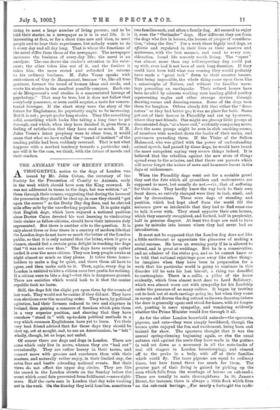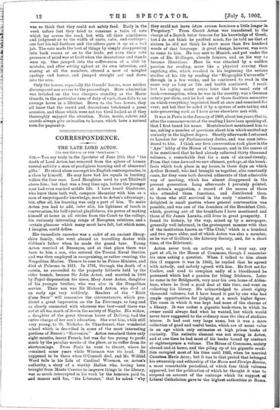THE ANIMALS' VIEW OF RECENT EVENTS.
ATHOUGHTFUL notice to the dogs of London was issued by Mr. John Colam, the secretary of the Society for the Prevention of Cruelty to Animals, early in the week which should have seen the Bing crowned. It was not addressed in terms to the dogs, but was written "at" them through their owners, suggesting that during the hours of the procession they should be shut up, in case they should "get upon the course" as the Derby Day dog does, and be chevied mile after mile by the unreflecting populace. It is quite right that English dogs, which have enjoyed a national position since Doctor Caius devoted his vast learning to vindicating their claims as fellow-citizens, should have their interests duly represented. But there is another side to the question. It is only about three or four times in a century of modern life that the London dogs do not have so much the better of the London public, so that it is only natural that the latter, when it gets a chance, should feel a certain grim delight in teaching the dogs that "it was not ever thus." The dogs have recently rather lorded it over the mere citizen. They can keep people awake at night almost as much as they please. It takes three house. holders to make a dog be quiet, and those three all have to agree, and then make oath to it. Then, again, every dog in London is entitled to bite a citizen once free gratis for nothing. If a citizen were to bite a dog P—but this is dangerous ground. There are societies which would look to it that the canine republic took no harm.
Still, the dogs felt the slight put upon them by the events of last week. They would not be canine if they did not. They have won elections over the muzzling order. They have, by political agitation, had their licenses reduced to two and sixpence in Ireland, thus gaining a measure of freedom which pats them in a very superior position, and showing that they have somehow "stood in" with up-to-date political methods in a way which common Englishmen have yet to learn. Yet their very best friend advised that for those days they should be shut up, set at naught, and, to use an Americanism, be " left " wholly, though, let us hope, not unfed.
Of course there are dogs and dogs in London. There are some which only live in mews, whence they are "had out" occasionally. They are rather horsey In their taste, and consort more with grooms and coachmen than with their masters, and naturally rather enjoy, in their limited way, the extra fuss and bustle attending national events. But their views a:lo not affect the upper dog circles. They are like the crowd in the London streets on the Sunday before the event which cruel fate prevented from fulfilment,—mere sight- seers. Half the carte seen in London that day take washing out in the week. On the Sunday they held families, sometimes
two families each, and often a family dog. All seemed to enjoy it, even the " Outlander " dogs. How different they are from. the dogs who live in houses, the houses of people of considera- tion, "along the line." For a week these highly bred dogs, as affairs and regulated in their lives as their masters and mistresses, with the best manner, and used to every con- sideration, found life scarcely worth living. The "upset" was almost more than any self-respecting dog could put up with, even had it not been of such long duration. If they could have been told what was coming they would probably have made a "great trek" down to their country houses. That being impossible, the whole thing came upon them like a catastrophe of Nature, and without the familiar warn- ings preceding an earthquake. Their refined homes have been invaded by odorous working men hauling gilded poultry representing eagles and other strange devices through drawing-rooms and dressing-rooms. Some of the dogs took them for burglars. Others clearly felt that either the "deco- rators" or they had better go; it was no place for both. Some got out of their houses in Piccadilly and ran up by-streets, where they met friends. One might see gloomy little groups of discontented dogs, "at a loose end," evidently comparing notes. Just the same groups might be seen in club smoking-rooms. of members with sawdust down the backs of their necks, and grievances pervading them. If the Vizier of the Sultan Mahmoud, who was gifted with the power of understanding animal speech, had passed by these dogs, he would have beard the more outspoken saying very severe things indeed. It is believed that the rebellion against the new state of things spread even to the aviaries, and that there are parrots which will never forget the noises of saws and hammers learnt in the days of midsummer.
When the Piccadilly dogs went out for a sociable growl they met the fate which all grumblers and malcontents are supposed to meet, but usually do not,—viz., that of suffering for their sins. They hardly knew the way back to their own front doors, so entirely changed were they in look, smell, and size by decorations. These were dogs of standing and position, which had kept aloof from the world till the nuisance grew so intolerable that they had to find some one to talk it over with. They stood opposite their own houses, which they scarcely recognised, and barked, half in perplexity, half in genuine disgust. At least two dogs are said to have gone by mistake into houses where they had never had an introduction.
It must not be supposed that the London dog does not lik e a little excitement or appreciate the pleasures of making a social success. He loves an evening party if he is allowed to attend, and is great at weddings. But he is a conservative, and an admirer of the status quo, and as he cannot know or be told that national rejoicings pass away like other things. he imagines when they have been in preparation for a week that his particular world is going to continue in this disorder till he eats his last biscuit, a thing too dreadful to contemplate. There is a collie, a pillar of the home evidently, which lives almost next door to Lord Salisbury, which was almost worn out with sympathy for his Lordship under the pressure of so many callers. It began by trotting out to look out at each carriage going in; but when they came in coveys and droves the dog retired to its own doorstep (where the door is generally open) and stood for hours, with its tongue out, panting in mere sympathy, and wondering evidently whether the Prime Minister would live through it all.
As for the other London household animals—the sparrows, pigeons, and cats—they were simply bewildered, though the horses quite enjoyed the fun and excitement, being born and trained for show. The sparrows thought that it was the annual spring-cleaning beginning again, or else the usual , autumn raid against the nests they have made in the gutters (a raid set down as a necessary in all the note-books of real old stagers in London housekeeping), and cleared off to the parks in a body, with all' of their families which could fly. The tame pigeons are equal to ordinary times, but here found these too much for them. The greater part of their living is gained by picking up the corn which falls from the nosebags of horses on cab-ranks. These are usually in main thoroughfares. In St. James's Street, for instance, there is always a. little flock which lives on the cab-rank leavings. ,q.F.or nearly a fortnight the traffic was so thick that they could not safely feed. Early in the week before last they tried to consume a train of oats which lay across the road, but with all their nimbleness and judgment as to the width of carts, cabs, and carriage-i. one lost his tail feathers and the others gave it up as a bad job. The cats made the best of things by simply disappearing into back rooms or on to the leads, yet even their cold presence of mind was at fault when the decorations and stands were up. One jumped into the coffee-room of a club by mistake, and after sitting aghast at its own intrusion, and staring at all the members, uttered a mew of mingled apology and horror, and jumped straight out and down into the area.
Only the horses, especially the Guards' horses, were neithei discomposed nor averse to the proceedings. More admiration was lavished on the two chargers standing at the Horse Guards, in the particular turn of duty of each, than falls to an average horse in a lifetime. Down to the 'bus horses, they all knew that the crowd and decorations betokened a great occasion, and those which were not too tired looked as if they thoroughly enjoyed the situation. Noise, music, colour, and crowds always give animation to horses, which have a natural turn for pageantry.















































 Previous page
Previous page